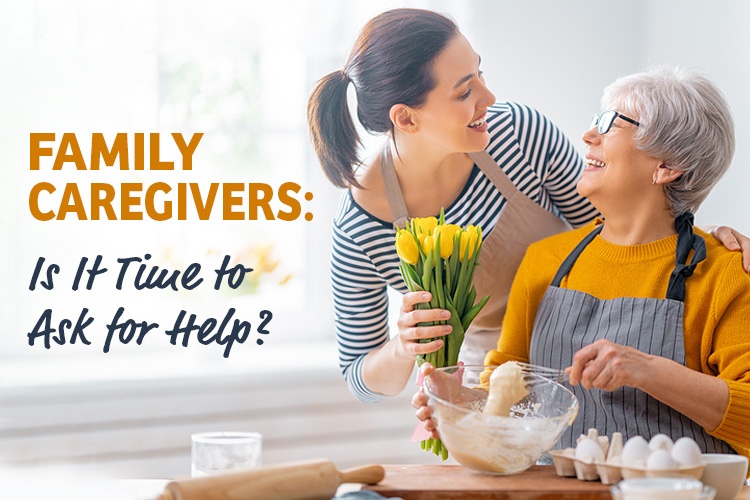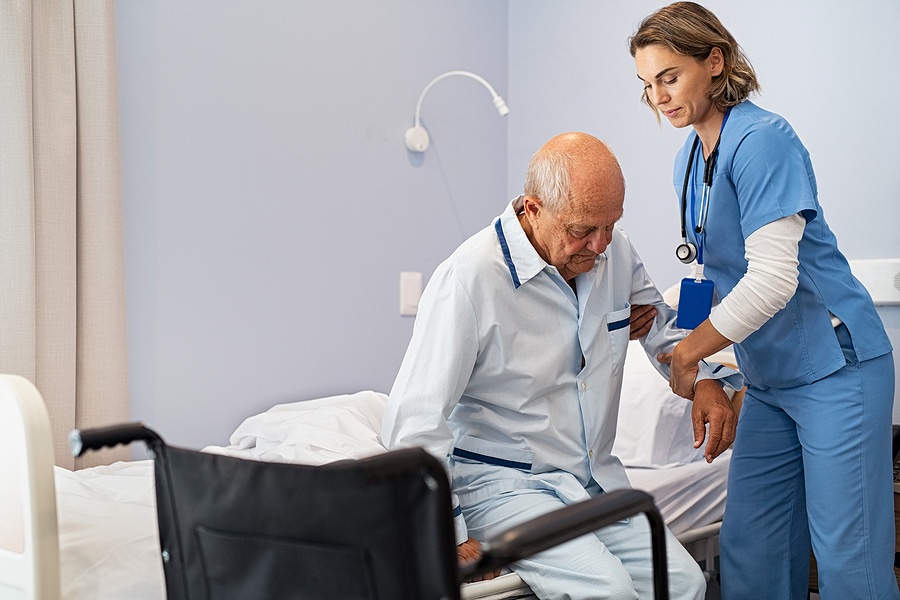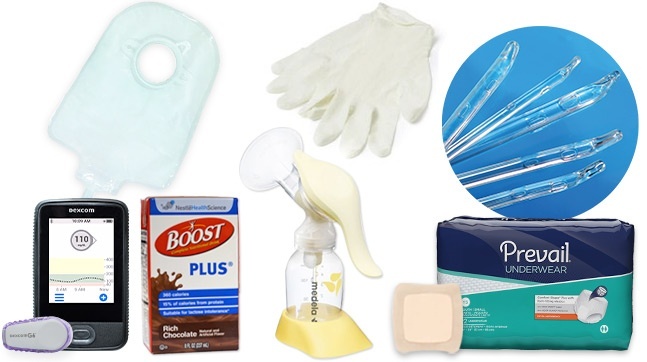Family Caregivers: Is It Time to Ask for Help?
This post was reviewed by our Director of Clinical Excellence and Oversight.
We see you, family caregivers. We know your days are filled to the brim. You manage prescriptions, attend doctor appointments, help with meals and hygiene, advocate with the insurance company, and celebrate your loved one’s wins, both big and small. And that’s just an average Tuesday.
You are a Caregiver with a capital “C,” and that stands for Concerned, Compassionate, Caring, and most of the time, Calm. The work of aiding a family member who needs your help is incredibly gratifying. It can also be exhausting and thankless.

Home Care Delivered was founded by a young man who came home to assist his ailing father, so caregiver love is in our DNA. You can read more about our founder Gordy Fox and how he got his start in HCD: The Story of a Lifetime.
The purpose of this blog is to address a complicated issue—the right time to turn over caregiving duties to someone, or someplace, else.
Beware of Burnout
The National Institute on Aging, a nonprofit advocacy organization, explains that there’s no one “right time” for a change. The agency notes that, “One family may decide a move is right because the parents can no longer manage the home. For another family, the need for hands-on care in a long-term facility motivates a change.”
Another reason is caregiver overload or burnout. Even for those whose only job is caregiving, it’s often a 24/7 position with little or no respite. Add to that managing one’s own family, working outside the house, exercise, and downtime, and the challenge is clear.
Here are some signs of caregiver burnout:
- Emotional and/or physical exhaustion
- Withdrawing from other family and friends
- Loss of interest in fun activities and hobbies
- Sense of sadness and hopelessness
- Ups and downs in appetite and weight
- Sleeping more or less than is typical
- Multiple colds or other signs that your immune system is weakened
- Thoughts of harming yourself, or the person you care for


The work of caring for a loved one who needs your help is incredibly gratifying. It can also be exhausting and thankless.
If you recognize yourself in more than a few of these bullet points, you may be suffering from burnout. Caregiver overload affects you and others in your immediate circle, but it also can take a toll on the person you care for.
The Institute on Aging puts it like this: “Remember the airline rule of putting on your own oxygen mask first in the event of an emergency? The same rule applies here. You have to take care of your own needs before you can help anyone else. After all, if something happens to you, who will help your family member?” According to one study, caregiver burnout is the number one reason leading to placement of a loved one in an assisted care facility.
Caregivers, even those who recognize they are feeling stressed out, often keep on keeping on without considering an alternative until things reach a crisis point. They often feel guilty or bound to remain in the caregiver role because it’s what they promised to do. However psychologist and author Barry J. Jacobs notes, “Effective family caregiving is not about rigidly hewing to hand-over-heart, solemn oaths, regardless of the potential negative consequences….It is about assessing the complex balance between needs and resources on an ongoing basis and then flexibly changing as the care receiver’s and family conditions change.”
Other Options
So, what are the alternatives to being cared for at home by a family member?
- Remain in one’s own home or another place with other family members sharing caregiver duties.
- Remain at home with paid, non-family help.
- Move to an assisted-living facility.
- Move to a long-term care facility.
- Move in with a family member.

Caregiving choices have a lot to do with the individual’s medical condition and ability to perform activities of daily living like eating, using the toilet, bathing, dressing, and walking. Cognitive status is a major concern as well—is the individual experiencing dementia or Alzheimer’s Disease? Those conditions may require specialized care. Other considerations are personal preference and the availability of facilities in your area.

Many families work out a successful plan where caregiving is shared—think of a relay race where the baton is passed, rather than a marathon with a single winner.
Get Ahead of the Decision
Although it can be hard, it’s wise to try to anticipate what’s next before a crisis of health, diminished cognition, or caregiver burnout create an emergency situation.
A good place to start is a family meeting or conference call to discuss options. Also, you may have caregiver support centers in your area, elder care locators, or senior consultants who can guide you. On its website, AARP offers this page with caregiver resources https://www.aarp.org/caregiving/local/info-2019/national-resources-for-caregivers.html.
If you aren’t yet in the position of being a family caregiver, but are thinking about moving an ill or elderly relative into your home, consider these questions:
- Do you have adequate space?
- Would you, or someone else, be available all day to lend assistance?
- What personal care tasks are you willing and able to perform, for example, are you able to help with the toilet, changing adult diapers, or managing a feeding tube?
- What types of services and support are available in your community to make things easier for you and the care recipient?

Lots to Think About
If you are currently caring for a loved one, be honest with yourself. Take the time to assess how things are going. If you are feeling depressed, experiencing crying episodes, sleep problems, or are constantly worrying about minor matters, you may be experiencing signs of burnout. If you need help from others, ask for it. If you need time for yourself, or possibly therapy, do what you can to make it happen. If it’s time to search for respite care, or an alternate living situation for your loved one, keep an open mind and take advantage of available resources and support.
Like many in your situation, you may have started caregiving some time ago, without a realistic picture of the cognitive, physical, and emotional changes that would come. Remember—family caregiving isn’t a contest. It’s doing your best for someone you love. And for yourself.

Home Care Delivered adds minutes and hours back to your life by delivering Medicare, Medicaid, and insurance-covered supplies right to your door, or to the home of someone you care for.
One More Resource
Time is one of the commodities most caregivers lack enough of. Home Care Delivered adds minutes and hours back to your life by delivering Medicare, Medicaid, and insurance-covered supplies right to your door, or to the home of someone you care for.
Feel free to enter your phone number on the bottom left of the screen and a member of our award-winning customer care team will give you a call. If you’re already using HCD and it’s time to re-order, find us at 800-565-5694.
HCD knows the heart of the caregiver, and we salute your dedication. Your love and compassion make the world a better place.


